International brands, social enterprises, expats, overseas citizens—they’re all making organic and eco friendly in India.
By Rutaksha Rawat
Visit ORGANIC SHOP by Pure & Eco India
India’s organic production is rising steadily, with the government now firmly backing the agenda. The cultivated area under certified organic farming in India has grown almost 17-fold in the last decade from 42,000 ha in 2003-04 to 7.23 lac ha in 2013-14 (with organic production of 1.24 mn tonnes). The states of Uttarakhand, Karnataka, Madhya Pradesh, Maharashtra, Gujarat, Rajasthan, Tamil Nadu, Kerala, Nagaland, Mizoram and Sikkim are actively involved in organic agriculture, with the government announcing plans to make Sikkim and Arunachal Pradesh entirely organic in the near future. Furthermore, Prime Minister, Narendra Modi, has allocated Rs 300 crore to organic farming for 2014-15, as a means to promoting it more extensively.
With its organic production escalating, its food and textile standards now commensurate with international certifications, readily available labour, and an increasingly favourable business clime, the time is opportune for international businesses and entrepreneurs to ‘Make in India’. More so, because certain India-specific products have now become ubiquitous to the world, such as turmeric and basmati rice, the former having gained global popularity for its health promoting properties.
Acknowledging the opportunity that lies in India’s robust production volumes and cheaper prices, many international businesses are already making their products in India, leveraging produce, labour and facility. Others are simply buying products from their Indian partners, who facilitate everything—sourcing and labour—at their own facilities for their foreign partners. One such example is Fyve Elements. The US based organic Indian food company is now available across 45 American states across 450 outlets and has tripled its sales since its inception in 2011. Promoted by founder Unni Nambiar, Fyve Elements, imports its products from its Indian partner, 24 Mantra.
A few entrepreneurs have made India home and have formed Private Limited companies locally but are making organic or eco friendly products using fair trade labour to sell largely to export markets, while others strike a balance between domestic and international distribution. Yet, others are social enterprises that cater fair trade products exclusively for an international audience.
Your correspondent introduces 7 such organisations.
ECO FEMME
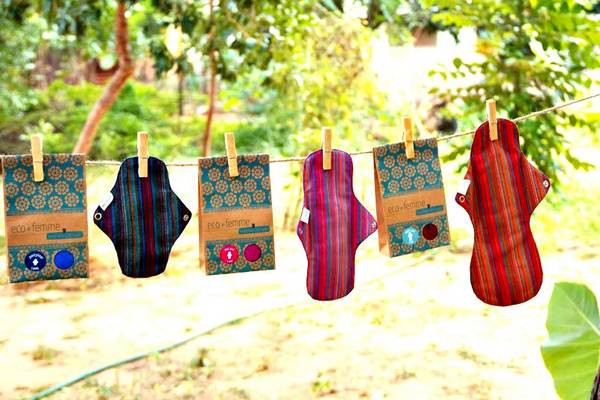
Feminine Hygiene goes Bloody Clean
Eco Femme aims to provide women of the world with a healthier, more eco friendly and sustainable alternative to using plastic-made sanitary pads. Its conception took place when Australian native Kathy Walkling and Jessamijn Miedema of The Netherlands met in Auroville, Tamil Nadu, in 2010, where both women worked at a local NGO (Auroville Village Action Group or AVAG) for the socio-economic upliftment of rural women. It was at AVAG that one day, while brainstorming for ideas on how rural women could be made to earn sustainably that the duo hit upon the notion of teaching them to sew cotton sanitary pads for export. Thus, Eco Femme product was launched in 2012 (although research and development started in 2010).
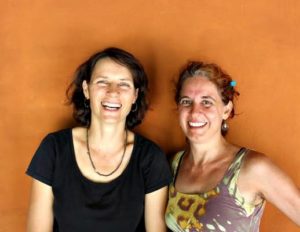
Jessamijn Miedema (left) and Kathy Walking
While the pads were devised as a means to providing livelihood for rural women in India, Eco Femme’s mission is much larger, encompassing limitation of waste disposal as much as possible. It is estimated that a single sanitary pad takes up to 800 years to decompose (due to its high plastic content). In India alone, it is projected that if every menstruating woman (at least 300 mn of us) were to use a sanitary pad, it would generate waste from 58 bn disposable pads each year! Furthermore, the bleaches used in disposable pads are unhealthy, generating dioxins, which are known to be carcinogenic (cancer-inducing). Therefore, the dire need for alternative menstrual products like cloth pads.
Only three years old, Eco Femme has picked up pace in the international market. Indian women, too, have begun to taken note of its virtues. On average, Eco Femme sells 880 pads per month in India, and 1,370 internationally (across 16 countries including UK, USA, Netherlands, Hong Kong, Spain, Germany, Mexico). “Over the past three years, we have sold approximately 55,000 washable cloth pads, effectively replacing about 4 million disposable products. Our work truly has a ‘ripple effect’ impact. Often, we hear stories of one woman switching to our pads—but it doesn’t stop there. She informs her friends and, one by one, they switch over too,” says Walkling, who migrated to Auroville in 1997.
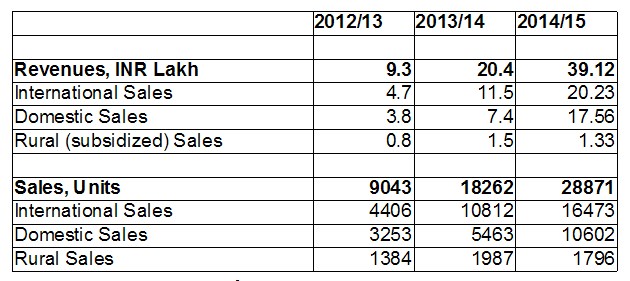
Table: Eco Femme Revenue Chart
The cloth pad maker offers users two kinds of pads—Premium and Subsidised. The premium range trades for full price in India, as well as, internationally, which makes room for the subsidy in the other range. The premium range comprises four different sizes of pads—strategically offered for the “heavier” and “leaner” days of the period. The subsidised range provides pads of the same quality and materials, but with a different pricing structure to accommodate rural women and girls.
The pads are stitched by women Self Help Group (SHG) members of AVAG hailing from rural villages around Auroville, who have been trained in tailoring and are paid fair trade prices (per piece) for stitching. Besides the commercial impact, Eco Femme, has also launched two wonderful initiatives—its ‘Pad For Pad’ and ‘Pad For Sisters’ programmes—both intended to provide economically disadvantaged women and girls with free or subsidised pads for healthy and dignified periods, as they are unable afford sanitary products by themselves.
In the near future, Eco Femme plans to amplify its international sales base, as well as, launch an organic cotton range of washable cloth pads and baby diapers for India and abroad. Also in the pipeline is the unveiling of its exclusive online store and a brand new website.
Eco Femme plans to amplify its international sales base, as well as, launch an organic cotton range of washable cloth pads and baby diapers for India and abroad
FREESET
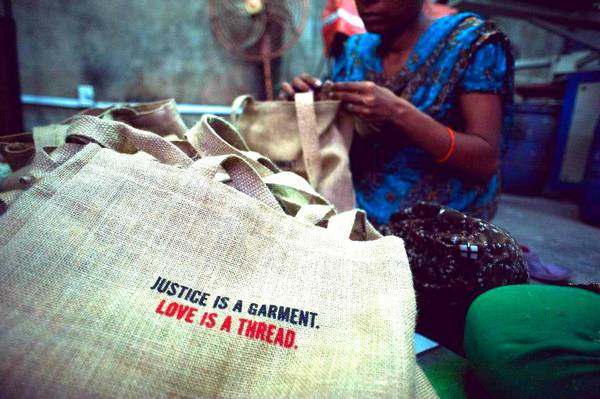
Organic Bags & Tees enable Choice for Freedom
In 1999, Kerry and Annie Hilton left New Zealand with their four children and moved to Kolkata with the idea of starting a business that would help people trapped in poverty. They found their work cut out for them when naively, they signed up for an apartment in the middle of the day, only to realise at night, that they had taken up residence in the largest red light area in the city—Sonagachi. Their new neighbours were thousands of women forced into prostitution by trafficking and poverty.
The Hiltons went to work. After experimenting with different products and testing the market for feasible options, they decided to train the women to make jute bags for export. Consequently, Freeset was founded in 2001. Initially producing only jute bags, organic cotton T shirts and cloth bangles, etc, were added to the range of offerings in later years.

Kerry and Annie Hilton
Employing 217 people currently, Freeset uses an ‘upside down’ model that turns the normal principles of running a business on their head. Businesses generally choose the best people for a job and pay them the lowest possible wages. Inversely, at Freeset, women are employed on the basis of their desire for freedom, not their qualifications or skillsets— many have had little or no education.
While primarily set up for the benefit of trafficked women, Freeset is environment conscious and has sustainability as one of its core values. The enterprise uses only water based ink for screen printing, avoiding harmful petrochemicals and compounds that can be hazardous to people and the environment. It also only uses Global Organic Textile Standard (GOTS) certified cotton in all its products.
In its continued endeavour to uplift sex workers, the company has established the ‘Freeset Business Incubator’ to help other “Freedom businesses” that aspire to extricate people from poverty. Freeset Fabrics (a weaving business), established in 2014, is the first venture in this vein—it trains women vulnerable to trafficking.
Freeset has impacted the lives of hundreds over the last 14 years since first having opened its doors in September of 2001. Although the years have streamlined business operations, setting up a new business in a foreign country came with its fair share of challenges for the Hiltons. “The time it can take to locate suitable premises, purchase buildings and gain mutation can be trying,” says Kerry. “In the early days things were difficult partly due to our own lack of experience, as well as, the unique challenges we faced employing women from the red light district. Finding and maintaining dependable supply chains has also been tough,” adds he, sharing the problems the company combated along the way.
But the rigours of novelty have passed. In the near future, Freeset looks forward to adding aprons to its range in 2016, in addition to a new line of handwoven scarves in August of 2015. Plans are also in the making for a new production unit capable of employing another 80 women over the next few years. While in the present day almost all of Freeset’s products are exported to USA, Canada, UK, New Zealand, Australia and Singapore, the freedom business does hope to expand its domestic business ‘some day’.
Freeset uses only water based ink for screen printing, avoiding harmful petrochemicals and compounds that can be hazardous to people and the environment. It also only uses GOTS certified cotton in all its products
PUKKA
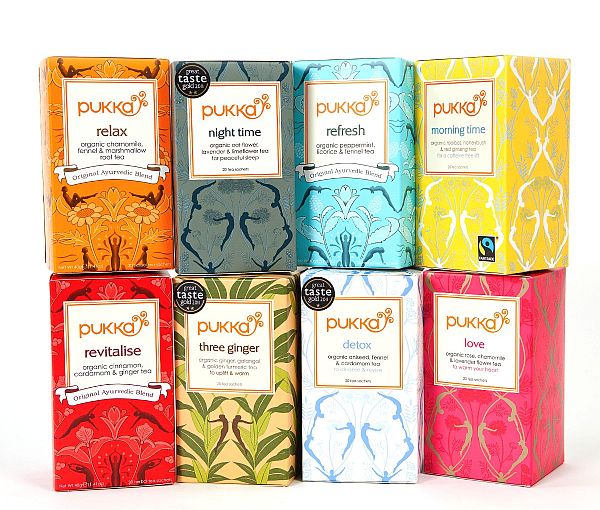
Proper Indian Herbs in Very British Tea
Pukka breathed its first in the year 2001 as a simple idea: to connect people with the incredible wonders of herbs. This idea manifested in an advertisement placed by Tim Westwell, an entrepreneur, in a Bristol magazine. The ad was read and answered by one Sebastian Pole, who had lived in India for many years studying Ayurveda and Yoga, and was fascinated with plants, conservation and herbalism.
Pole, incidentally, had already been contemplating starting a business in the field of herbs when he came across Westwell’s advertisement, offering help to start ethical businesses. Having tried many herbal teas over the years, Pole was fed up with dusty flavourings. He wanted to offer people a delicious cup of herbal tea. He also wanted herbs to be at the heart of effective herbal solutions, by creating supplements that could work wonders for people and the planet. So he responded to the ad and Pukka was formed shortly thereafter. Little did the duo know that in 2015, just 14 years after they established the company, a million cups of Pukka’s organic teas would be enjoyed across the world every day.
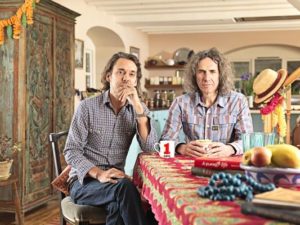
Sebastian Pole (left) and Tim Westwell
Today, Pukka, exports to over 30 countries worldwide, with over 50 percent of its turnover coming from export sales alone. The company has been buying raw materials in the organic sector from India for the last 14 years. With the help of its India partner, Phalada Agro, it buys herbs for use in its teas from Karnataka, Maharashtra, Uttar Pradesh, Rajasthan, Gujarat, West Bengal and Tamil Nadu. It also procures black tea from Dunsandle Estate in Tamil Nadu; special tea from Darjeeling; and green tea from Oothu, India’s first organically certified tea garden (also in Tamil Nadu). Collectively, the UK tea maker buys a couple of hundred tonnes of organic herbs and tea from India per year.
Although currently only available in India at select stores and on Amazon.in, Pukka intends to start manufacturing in the country as a way to value add at source. “We love India at Pukka. Its Ayurvedic wisdom and philosophies have inspired many of our values. As Pukka grows, India will become more significant to us as a country for both sales and raw material supply. And because we are called Pukka, we want to bring a bit of that authentic ripe deliciousness back into the Indian herbal tea drinker’s experience as well,” smiles Pole.
For all its love of the country, however, Pukka does have a few pointers for Indian authorities and policy makers to enable smoother and more voluminous trade. “The organic regulators APEDA would do well to help minimise bureaucracy and increase the rigour of audits to maintain organic integrity and facilitate ease of business. Investment in machinery and equipment for efficient processing and improved consistency in quality will be another key for success. Lastly, perhaps the Indian government could rethink the levying of 100% tax on import of herbal teas, which is an impediment to successful trade,” suggests Pole
We love India at Pukka and intend to start manufacturing in the country as a way to value add at source. The organic regulators APEDA would do well to help minimise bureaucracy and increase the rigour of audits to maintain organic integrity and facilitate ease of business. Also, perhaps the Indian government could rethink the levying of 100% tax on import of herbal teas, which is an impediment to successful trade
NUDIE JEANS
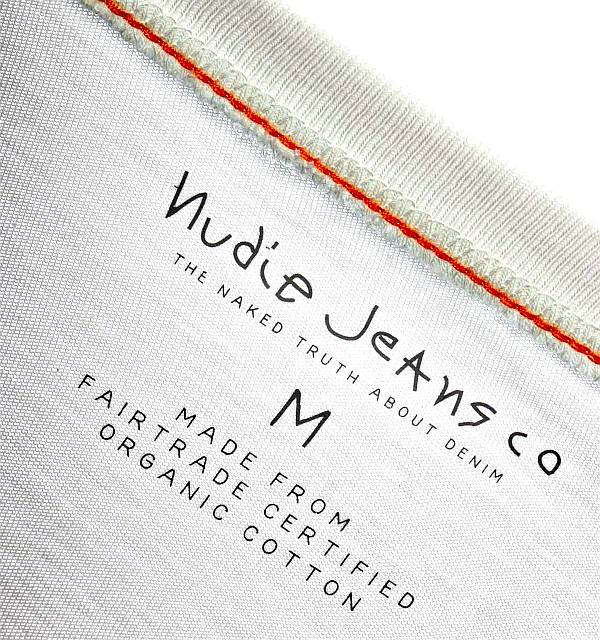 Swedish Organic Clothing Made in India
Swedish Organic Clothing Made in India
Swedish clothing brand Nudie Jeans originated in Gothenburg, Sweden, and was founded in 2001 by Maria Erixon, a former employee of Lee Europe. With Palle Stenberg as its CEO, Nudie specialises in raw and prewashed denim jeans, but the company’s collection includes many other items of casual clothing such as organic cotton T shirts, etc. The brand is one of the most successful Swedish apparel companies (both domestically and internationally) and retails in over 20 countries, including India, where it is retailed through Aditya Birla Group’s Madura Garments and The Collective.
Not only does Nudie retail but it also makes its organic cotton T shirts in India since 2012. The decision to move production from Europe to India was owing to the high volumes of fair trade organic cotton available in the country, coupled with the fact that India allows for quality controlled manufacturing as well.

Palle Stenberg
Nudie’s core value is to provide sustainable clothes that have been made at fair trade prices. Communicating its emphasis on responsible consumerism, Nudies’ website claims they “do not envisage a trade off between profit and people, or between manufacture and environmental responsibility”. To this end, fair trade conscious Nudie pays Indian workers living wages, not just minimum wages. “We became 100% organic a few years ago; our next step is to be 100% transparent—to show everybody everything,” says Stenberg.
Illustrating his experience of working with India and its people, Stenberg says, “It has been very collaborative. We have openly discussed initial hiccups and challenges with our India partners and have watched the quality of our products improve steadily during the last few seasons.”
Nudie is satisfied, says Stenberg, with its India operations and is here to stay for the long term, recently having added a new supplier for production of its GOTS certified organic cotton T shirts. “From our experience so far, we think that effective communication and understanding of sustainability issues are very strong in India, the challenges being cultural differences and longer lead times compared to production in Europe. But overall, we love working with our partners in India, and hope to grow in a sustainable way together with our suppliers,” says Stenberg.
From our experience so far, we think that effective communication and understanding of sustainability issues are very strong in India, the challenges being cultural differences and longer lead times compared to production in Europe. But overall, we love working with our partners in India, and hope to grow in a sustainable way together with our suppliers
CLOTH & CO
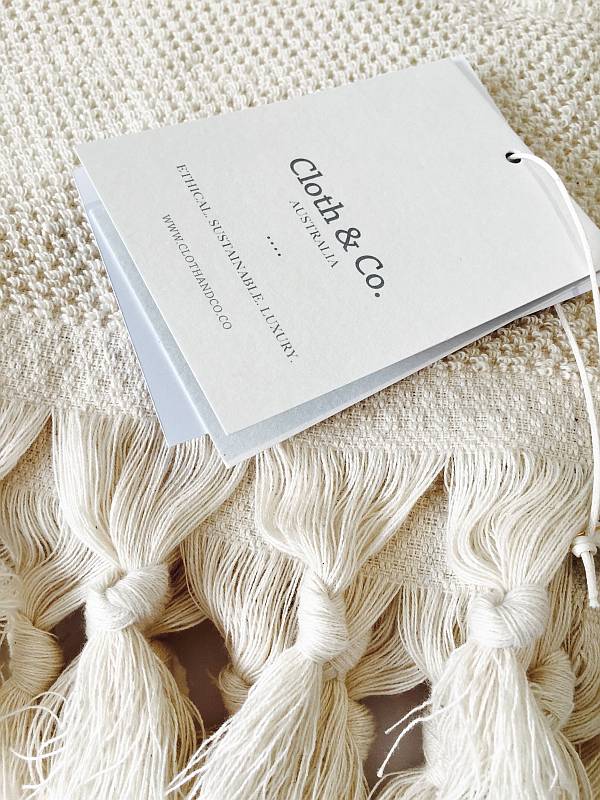
Luxury Weaves by Indian Women
Founded by Caroline Poiner in June 2014, Cloth & Co is an Australian based retail brand that was created with the purpose of bringing artisan made products to people in Australia, with the binary objective of uplifting the women who made them, as well as, introducing Australians to exquisite crafts from a land exotic to them.
Also a partner of Threads of India, the luxury ‘Special Interest’ tour designed for lovers of textiles, Cloth & Co procures its products from India, where women workers produce handspun and handwoven Yak shawls and throws. A sister company to Australian social enterprise, Artisans of Fashion, Cloth & Co helps to fund the enterprise’s development projects in India. Most of its products are developed by women’s cooperatives and SHGs (comprising 50-900 women), with the aim of providing employment, empowerment and education. Currently, Cloth & Co works with a number of communities in various regions in India including Jaipur, Udaipur, Uttarakhand, Madurai, West Bengal and Gujarat.
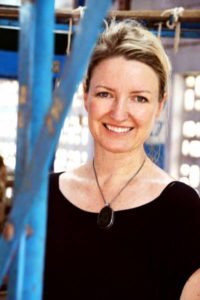
Caroline Poiner
“There is so much I love about India. It’s a land of every possible contrast—a collision of colour and sound, extremes of wealth and poverty. There really is so much diversity, in the people, the religions, the culture, the languages, artisanal skills, the land, the built and the natural environment,” gushes Poiner, who has been a consistent visitor to the country over the last 15 years. It was on a train trip to Rishikesh with her daughter that the concept of Artisans of Fashion came about. The mother-daughter duo was trying to devise a way to combine the compelling nature of high fashion with traditional Indian artisan techniques to help alleviate poverty in the region. As Artisans of Fashion is a Not For Profit company, when, later, the idea of selling the products came up, a brand needed to be created—and thus Cloth & Co was formed.
The Mandakini Women Weavers Association (MWWA) in Lamgaundi, Garhwal, is one of the key projects that Artisans of Fashion has been supporting over the past 18 months, since landslides and floods devastated the region in June 2013. There are several other facilities that have been set up as part of a rehabilitation project to create a self sustaining livelihood for 300 disaster affected families from 7 villages in the Uttarkashi region. Initiated by Mukti Datta, managing director, Panchachuli Women Weavers (PWW) in Almora, MWWA was formed with training imparted by expert women workers from PWW.
Cloth & Co employs all-natural, locally sourced fibres, chemical free dying and hand crafted processes across its range of products. Its organic cotton towels are handwoven with GOTS certified organic cotton and the brand is in the process of developing a clothing collection that will be vegetable dyed organic cotton, as well as, locally spun and woven khadi and wool.
“We find that quality control and time or budget shifting are our greatest challenges, which in some cases can be fairly major,” says Poiner, speaking of the challenges Cloth & Co meets on Indian soil.
Also fairly major are Poiner’s plans to plough ahead—Cloth & Co plans to launch the brand in India and is also looking at opportunities to dispatch products directly to other international markets.
It’s hugely rewarding to work with Indian artisans. We do find that quality control and time or budget shifting are our greatest challenges, with the large number of workers being a positive for greater production
YOGASANA
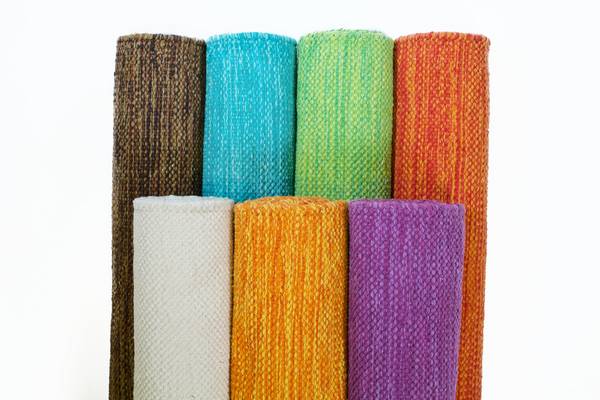
Eco Friendly Mats for Global Yogis
Founded by American Kevin Aylward, Yogasana began production in 2010 with the goal of making eco sustainable yoga mats for the US market. With its production facility in Varanasi in Uttar Pradesh, Yogasana’s mats are made of pure cotton and all production is carried out by hand on manual looms. The dyeing process is natural and the residual dye water is treated and used for irrigation of vegetable crops in the region. Each yoga mat is signed by the weaver who made it, the signature representing the hand off from weaver to yogi. A fair trade paymaster, Yogasana is also founding member of the Sustainable Furnishings Council (SFC), a US based organisation promoting sustainable practices in the home furnishing industry.

Kevin Aylward with wife Parmjit
Next, Yogasana has plans of going organic. They have, so far, been unsuccessful in finding an ideal seller, as most mills provide organic cotton made specifically for apparel and textile suppliers. “The few mills that can supply the kind of cotton we seek for mat production are located far from our facility, and sell at a cost that is not practical, nor sustainable for us. We continue to seek a source of supply for certified organic cotton and hope to locate a partner in the near future,” says Aylward, who has been making cotton rugs in India since 1996 under another brand owned by him—‘Prairie Rugs’.
The mats have been welcomed back at home in the US, due to their versatility; they can be used for most styles of yoga and can be used indoors and outdoors as opposed to rubber/plastic ones, which can’t be used outdoors for extended periods of time. Primarily supplying to the US market, Yogasana dispatches individual orders to over 50 countries worldwide.
To the sale of Yogasana in India, the country of its origin, Aylward says aye. “We will definitely offer our mats for sale in India in the future. Our production will always remain here as well,” says he.
Yogasana’s mats are made of pure cotton and all production is carried out by hand on manual looms. The dyeing process is natural and the residual dye water is treated and used for irrigation of vegetable crops in the region. Each yoga mat is signed by the weaver who made it, the signature representing the hand off from weaver to yogi
EARTH LOAF
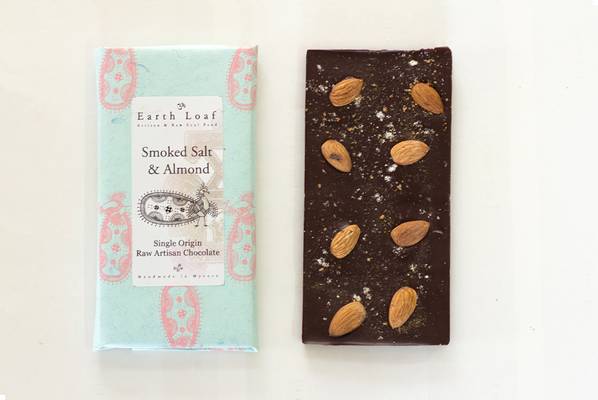
Salt-of-the-Earth Organic Chocolate from South India
South African native, David Belo, had been looking for a testing ground for several business ideas, one where he could experiment without risking high capital investment, as would have been the case in London, where he was based before moving to India. “This, of course, was before ‘Make in India’ was initiated as we arrived in 2011, but PM Modi’s initiative has furthered our confidence in what we’re doing,” says Belo, who founded Earth Loaf along with partner Angelika in 2012. Earth Loaf sells a range of organic dark chocolates for the domestic market and is geared to plunge into export—to Australia, South Africa and USA.
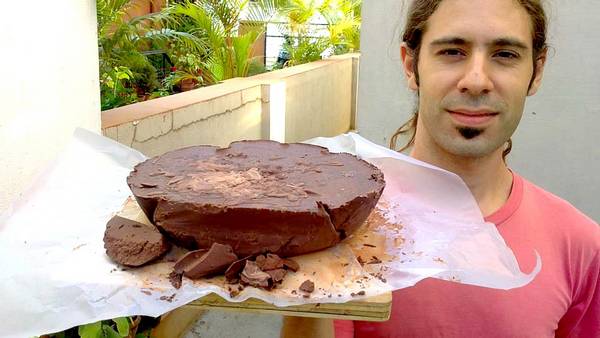
David Belo
The vision of Earth Loaf is multifold: it wants to demonstrate the quality of organic Indian produce and the potential of Indian craft foods through a world class chocolate, thus changing the international perception of craft in India; to nurture creative careers through artisan training programmes; to make Earth Loaf recognised in the artisan chocolate community worldwide, as well as, to encourage consumers in India to invest in quality fine foods, rather than spend blindly on mass produced industrialised foods.
The chocolate maker wants to give impetus to organic agriculture in the country, and withal expose Indian palates to less sweet, more balanced foods, for mental clarity and physical balance. “This is the reason we only make chocolate at 72%, without bowing to sweeter palates,” explains Belo. Both the cacao and the palmyra sugar in Earth Loaf’s chocolates are certified-organic and the company also liaises with other artisans such as Blue Tokai for their coffee for some of its concoctions.
On the ease of doing business in India, Belo says it’s relatively straightforward to set up business here, although, he opines certain bureaucratic formalities haven’t been thought through properly for fluid processing for foreign citizens. Setting up a Pvt Ltd company can also be tedious, taking 4 to 8 weeks due to the rigidity in the registration process, in comparison with countries like the UK, where one can register a company online in 30 minutes flat. Basic procedures like obtaining a TIN number for foreign owned companies in tier two cities like Mysore (where Earth Loaf is based) can also be long drawn.
As for the prevailing business climate, according to Belo, it requires some adjusting to. “Business English in India can be unique, emails can sometimes go unanswered for days, etc. But the plus side is, there is a certain flexibility here which stands in pleasant contrast to the rigidity of doing business in Northern Europe. This can work brilliantly to the advantage of a small scale business in its early days,” points out Belo.
“Also, the majority of the people I deal with are warm, friendly and enthusiastic members of the business community nationwide. Overall, I’m very happy to be making in India, and feel it is an exciting time to be here!” he adds.
In tier 2 Indian cities, Business English can be unique, emails can sometimes go unanswered for days, etc. But the plus side is, there is a certain flexibility here, which stands in pleasant contrast to the rigidity of doing business in Northern Europe – this can work brilliantly to the advantage of a small scale business in its early days
All photographs featured in this article are the property of the respective outfits/people mentioned and cannot be used without permission
This article appeared in the July 2015 issue of Pure & Eco India


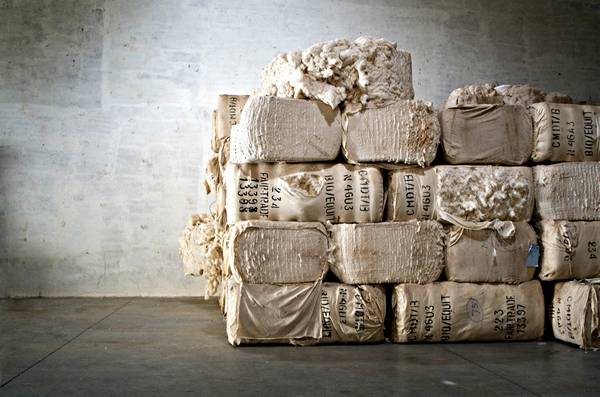
Leave a Reply